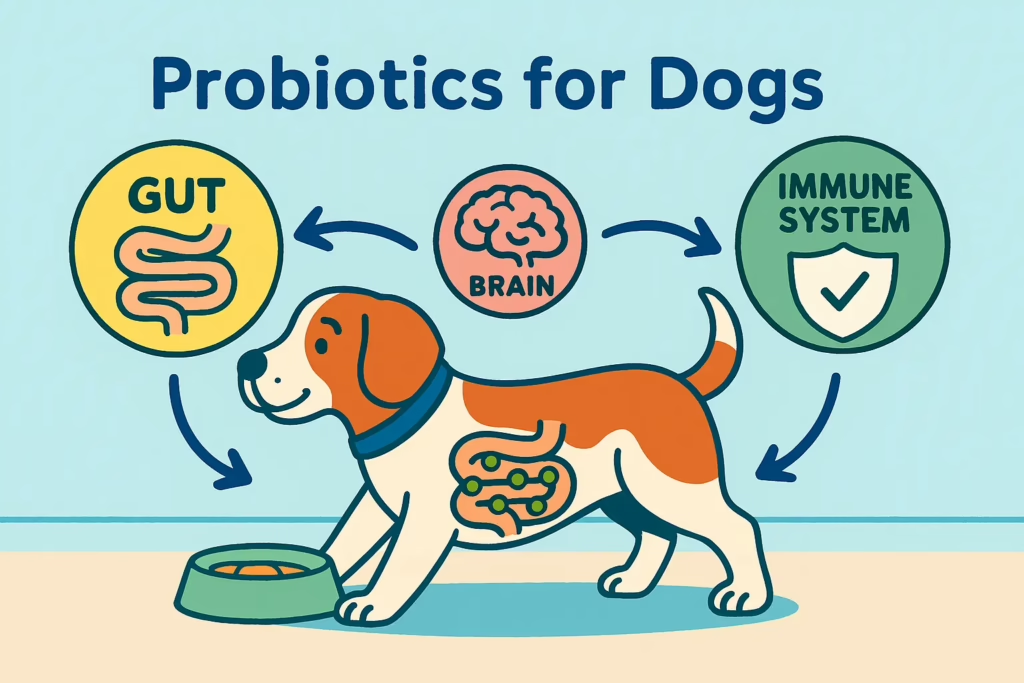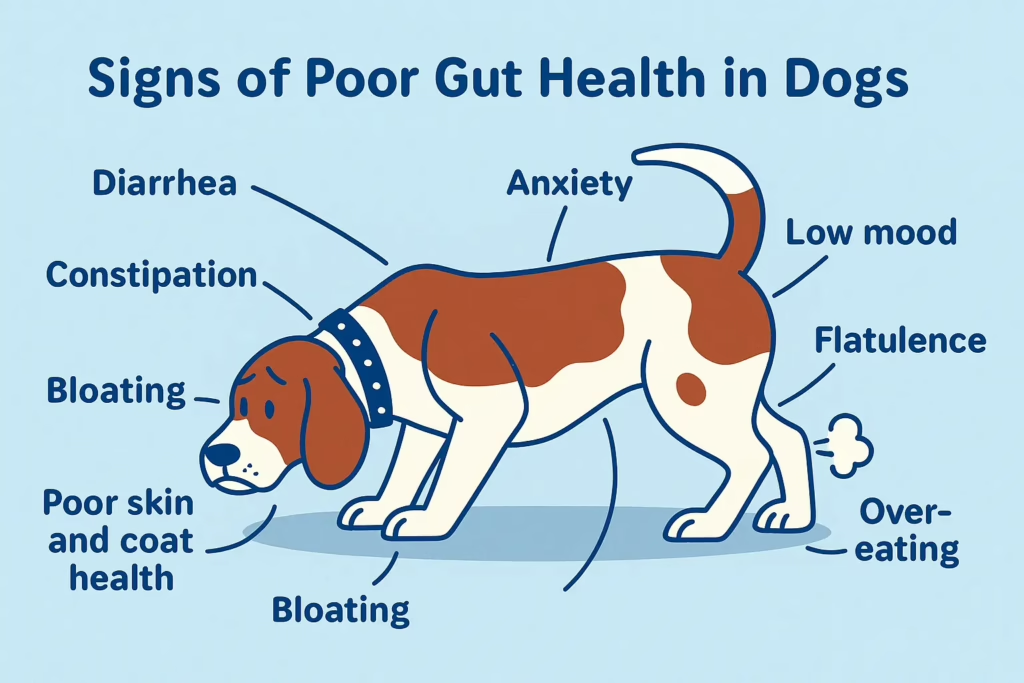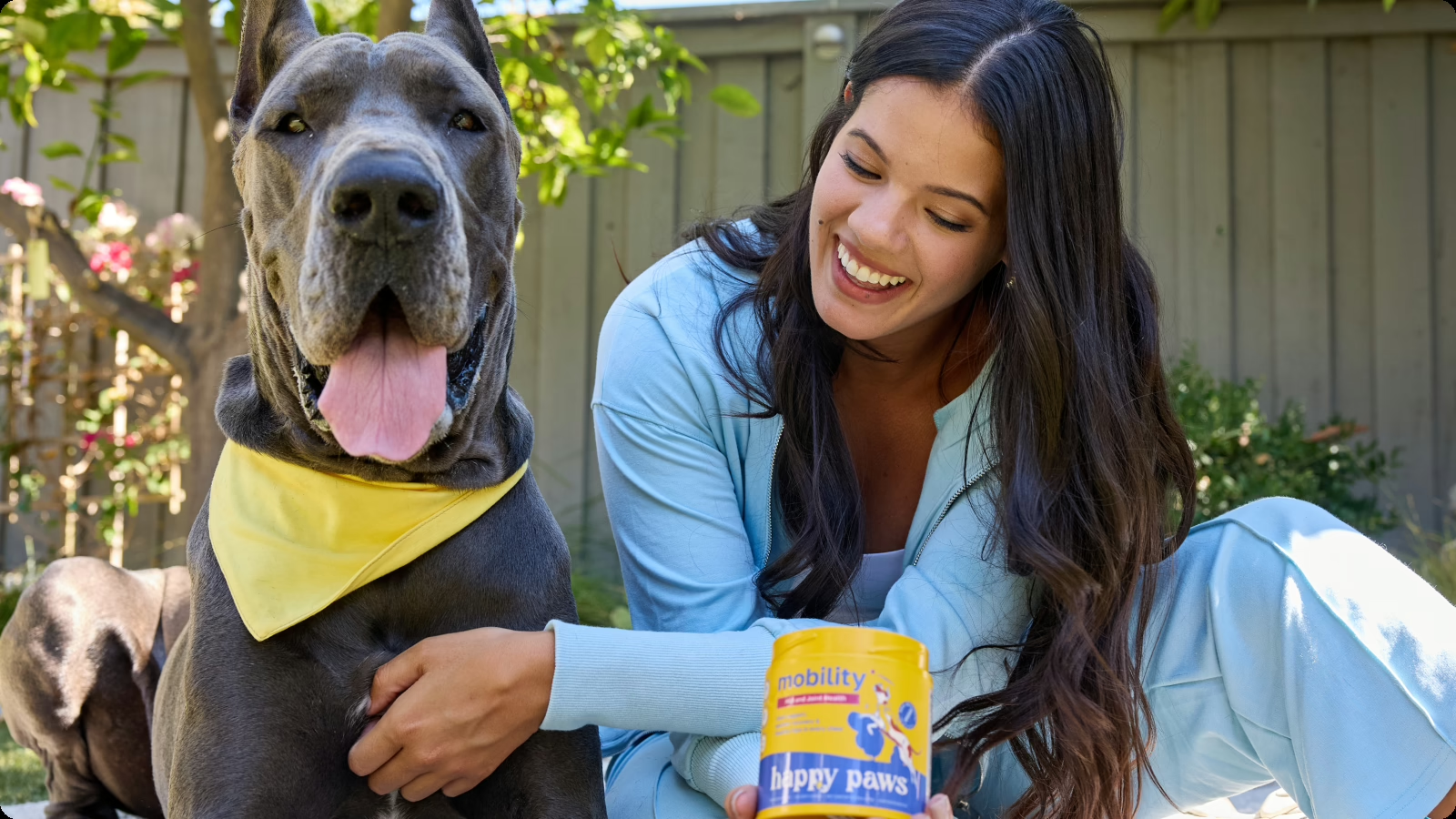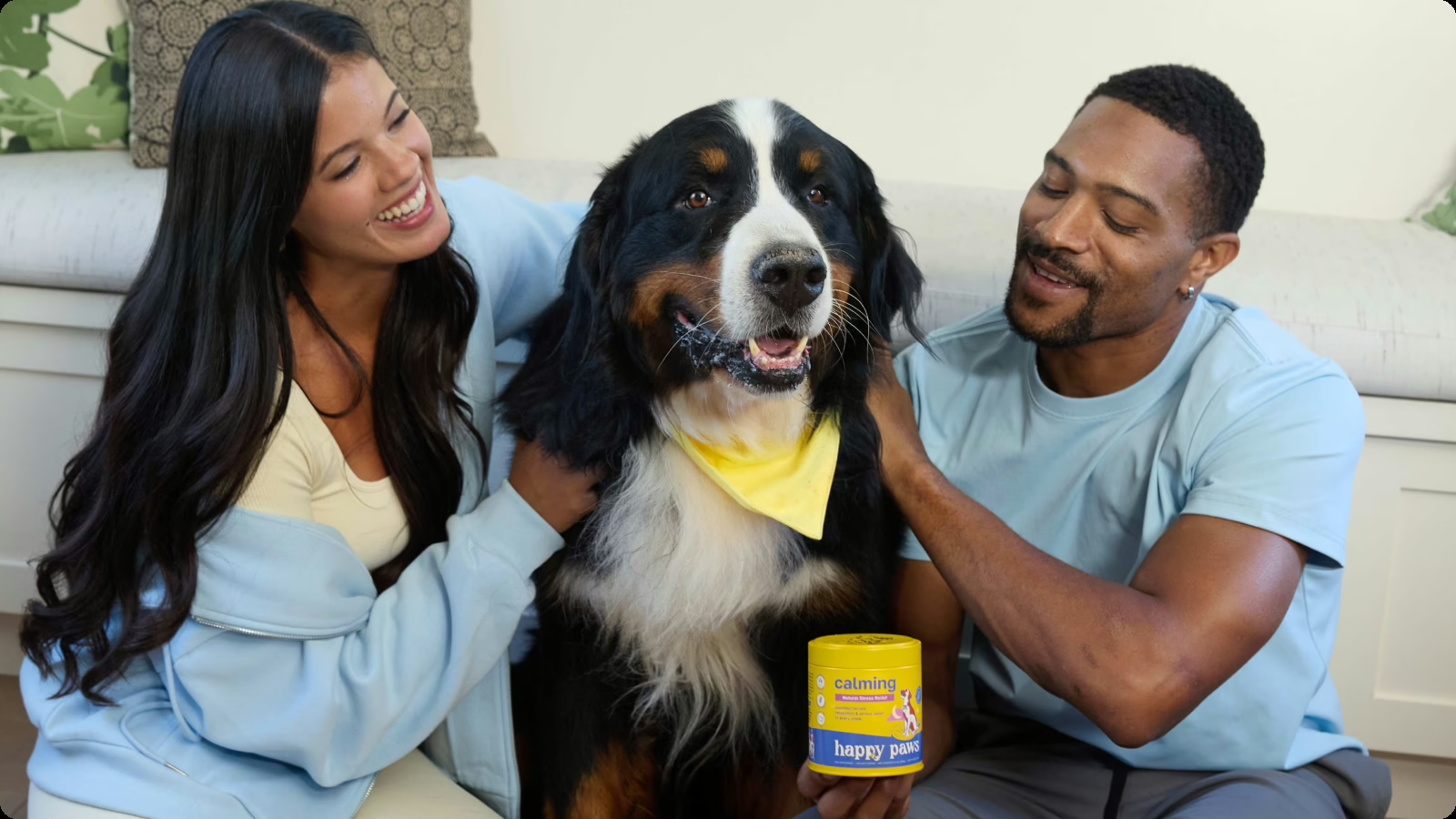Probiotics for dogs are supplements that introduce live, healthy microorganisms to enrich and fortify your dog’s natural gut flora. Your dog’s gut microbiome naturally carries trillions (yes, with a “t”!) of these same microorganisms. At any given moment, these microscopic molecules are rushing along, digesting food, regulating mood, communicating with the immune system, and managing an endless influx of new problems that arise in a dog’s daily life.
Did your pup just eat some trash? These microorganisms have to get involved. Did your dog catch a bug? Don’t worry—these microorganisms are clocking in to assess the damages. They often work overtime to keep your dog in tip-top shape, tackling whatever your dog so generously gifted them.
But as your dog ages, these microorganisms can weaken and slowly dwindle in numbers, leading to a worker shortage in your dog’s gut microbiome. That’s where dog probiotics come in. In this article, we’ll show you what canine probiotics are, what they do, and why they’re a go-to for so many pet parents to support their dog’s health.

Why Your Dog’s Gut Health Matters
Believe it or not, your dog’s microbiome is the foundation for their nose-to-tail canine health and wellness. It’s sort of like the first line of defense that weeds out pathogens, viruses, and toxins from making contact with your dog’s liver: the gateway to their bloodstream. Your dog’s gut is a three-part structure that consists of the stomach, the small intestine, and the large intestine. These organs are lined with trillions of microorganisms that neutralize threats and only usher along healthy, beneficial compounds.
These microorganisms also absorb nutrients and minerals from food, reaching out to grab healthy compounds before passing the food along the digestive tract. This is where we’ll go off-leash for a second and explore the unique relationship between your dog’s gut health and overall well-being.
Gut-Brain Axis
The “gut-brain axis” may sound nebulous, even a little nefarious, but it just describes the intricate relationship between your dog’s gut flora and their brain health. Just like with us, your dog’s gut microbiome plays a large role in their cognition. When your dog eats a vitamin-rich, nutrient-dense diet, the gut flora absorbs these healthy compounds and passes them along to your dog’s brain, gifting their cerebral cells a ton of resources to operate smoothly.
But when your dog isn’t getting the necessary nutrients, or their gut microbiome isn’t up to snuff, this relationship can grow strained. Your dog’s brain is calling on the gut to pass along nutrients. But, their gut microbiome may not have enough microorganisms to properly digest and absorb. Or, their diet may lack these essential nutrients altogether. This lapse in the gut-brain axis can lead to a number of problems that stem from poor brain health, like low mood and anxiety.
Connection With Immune System
To further the importance of a healthy gut flora, your dog’s microbiome plays another key role in their immune system. Your dog’s microbiome helps filter out pathogens, toxins, and viruses found on daily walks and trips to the park. When these microorganisms work efficiently, they can weed out these harmful molecules. And when they aren’t working well? Your dog’s immune system may be sent into overdrive, working harder to cover the gaps left by their microbiome. This can lead to an overactive immune system, which can bring about a number of canine concerns.
Signs of Poor Gut Health in Dogs

While there are a few tell-tale signs of poor gut health in dogs, it’s always best to seek professional veterinary guidance to discern your dog’s individual needs.
Here are a few signs of poor gut health in dogs.
- Diarrhea
- Constipation
- Anxiety
- Low mood
- Bloating
- Flatulence
- Poor skin and coat health
- Over-eating
What Can Damage Your Dog’s Gut Health?
Your dog’s digestive system is robust—seriously. It can withstand much more than ours. And yet, there are a few things that can disrupt this balance.
Post Antibiotics
Antibiotics for dogs are meant to neutralize harmful bacteria in your pup’s system. These vet-prescribed tablets help fight off infections and restore health, unfortunately wiping out healthy bacteria along the way. All those trillions of microorganisms we mentioned above get neutralized after your doggy completes a round of antibiotics. So, after giving them their last antibiotic, consult your veterinarian about adding a probiotic supplement to their diet, all to help get their gut health back up to snuff.
Golden Years
As dogs age, just like us, their organs don’t operate at the same efficiency. This is a main factor as to why many older dogs have tummy troubles; their gut health isn’t as robust as it was during their younger years. Many older dogs struggle with constant bouts of diarrhea, constipation, and upset stomachs, possibly stemming from poor digestive function. If this sounds like your grizzled pup, it’s always best to consult your veterinarian about next steps. Maybe a probiotic supplement is in their future.
The Occasional Bug
And any experienced pet parent would say that tummy troubles aren’t just native to older pups. Dogs of all ages can catch an occasional bug that disrupts their digestive health, leading to bouts of flatulence, loose stool, and constipation. Many different doggy viruses and bacteria can derail their gut health. So, it’s always best to consult your veterinarian if you think your dog may have caught something.

What Are Probiotics for Dogs?
Probiotics for dogs are formulated supplements that contain healthy, active microorganisms alongside a number of other beneficial, dog-friendly ingredients. These microorganisms are live bacteria (the good kind) that join the natural probiotics in your dog’s gastrointestinal tract, lending a helping hand to better absorb nutrients and filter out toxins. When taken daily, a probiotic supplement can help fortify your dog’s gut health, which, according to the AKC, has been shown to enhance immune response in dogs of all ages.
Happy Paws Probiotic Dog Chews
For an easy, flavor-packed way to sneak these healthy probiotics into your dog’s daily routine, our Probiotic Dog Chews mask all that healthy goodness with a pup-approved, vegan chicken flavor. These gut-health chews use a blend of P-6 probiotics to fortify and enrich your dog’s gastrointestinal tract. Plus, they offer antioxidant-rich nutrients to settle digestion, relieve bloating, and even promote fresher breath. And all that’s wrapped up in a tasty, tail-waggin’ flavor your dog will love, love, love! (Your dog won’t know they’re healthy.)
Like our complete line of dog supplements, our Probiotic Dog Chews are made with organic, all-natural ingredients and come backed by a team of veterinarians, dog owners, and pet lovers.
Probiotics vs. Prebiotics
Now, we know where most dog parents sit at this moment. They’re researching the best probiotics on the market, filtering through reviews, combing through labels, and trying to decide what’s best for their furry family member. In all of this searching, you’ve probably run into (and maybe even mixed up) probiotics and prebiotics.
Simply put, probiotics eat prebiotics. Prebiotics are fibrous compounds that provide nutrients to probiotics, helping them stay functional and effective along your dog’s digestive tract. You can find a number of prebiotic-rich foods, like sweet potatoes and pumpkin seeds, in our Probiotic Dog Chews.
Benefits of Probiotics
Since your dog’s gut health is so instrumental to overall health and well-being, probiotics can have far-reaching benefits. Here are just a few veterinarians have noted:
- Calmer moods
- Fresh breath
- Healthy skin and coat
- Firm, natural stool
- Boosted immunity
- Better weight management
- Robust gut health
Types of Probiotic Supplements
If you’re searching for canine probiotics, there are two popular forms: chewable tablets and powders. At Happy Paws, we’re “Team Chews” all the way. Here’s why.
Chews vs. Powders
Powders may be convenient to mix onto kibble or shake into some dog-friendly smoothie, but they don’t help you precisely dose your dog’s preferred serving. Half a packet, a full packet, a packet and two-thirds. It can all get confusing—and messy. Dog supplements are meant to be given to dogs based on their weight. And it’s best to stick to that serving size, so your dog’s not having too many treats in a single day. (Don’t tell your dog we said that.)
Chews, on the other paw, are pre-measured and perfectly packed with a precise dose of healthy goodness—no mixing, shaking, or stirring. Just find the appropriate serving for your dog’s weight, and let them enjoy that serving daily.
Need a little help deciphering how much to give your dog? Here’s a quick guide.
| Happy Paws Supplement | Under 10 lbs. | 10–30 lbs. | 31–60 lbs. | 61–90 lbs. | 90+ lbs. |
| Probiotic Dog Chews | 1 soft chew per day | 2 soft chews per day | 3 soft chews per day | 4 soft chews per day | 5 soft chews per day |

How to Give Probiotics to Your Dog
If you’re unsure how to give your dog a daily probiotic, here are two easy paths.
A Daily Wellness Treat
First, pull out the can of Happy Paws treats. If your dog hasn’t already perked up, call them over, ask ’em to sit, and fork over their preferred serving size for good behavior. These all-natural, organic supplements come with a seriously delicious flavor. Your dog won’t even know they’re healthy.
A Kibble Topper
Or, if you’d like to take a more covert path, add these chews to the top of your dog’s kibble. Mix it around, and let ’em discover these treats during breakfast or dinner.
Parting Thoughts on Dog Probiotics
The world of dog supplements can definitely feel overwhelming, confusing, scary, and downright paw-ful. (Last dog pun, I paw-mise). But that’s why we started Happy Paws: to deliver high-quality, all-natural dog supplements to owners who want the best for their pups. Whether you choose to order our Probiotic Dog Chews or another health-enriching supplement from our collection, you will always get the best, so you can give nothing but the best to your bestie.





